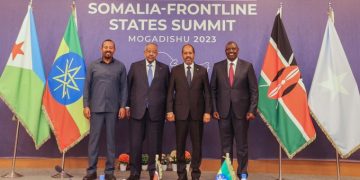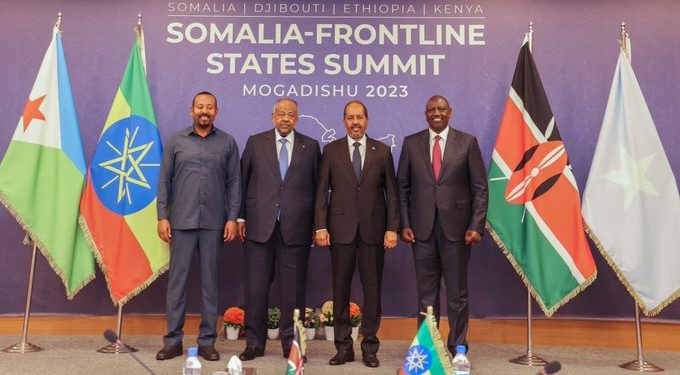The leaders of Somalia and neighbouring countries vowed at a summit on Wednesday to “make the final push” against Al-Shabaab as a wide-ranging offensive against the militants gathers pace.
Kenya’s William Ruto, Djibouti’s Ismail Omar Guelleh and Ethiopian Prime Minister Abiy Ahmed attended the summit hosted by Somalia’s President Hassan Sheikh Mohamud in the capital Mogadishu.
They discussed a coordinated military offensive against the Al-Qaeda-linked group, which has been waging an insurgency in the troubled Horn of Africa nation for more than 15 years.
In recent months, the Somali army and local clan militias have retaken chunks of territory from the militants in an operation backed by US air strikes and an African Union force known as ATMIS.
But Al-Shabaab still control parts of the countryside from where they have carried out numerous retaliatory attacks both in Somalia and in neighbouring countries.
The leaders pledged to pursue and destroy the jihadists in their strongholds across south and central Somalia in a “robust operational campaign” involving the four countries and “through military, finance and ideology”.
“The time-sensitive campaign will prevent any future infiltrating elements into the wider region.”
The meeting comes a day after defence ministers and security chiefs of the four countries met in Mogadishu to prepare for the summit.
Security was beefed up in the city on Wednesday with movement restrictions, military patrols and all commercial flights suspended.
‘All-out war’
After taking office in May last year, Mohamud declared an “all-out war” on the jihadists, rallying Somalis to help flush out members of the jihadist group he described as “bedbugs”.
But the jihadists who were forced out of the capital by African Union troops in 2011 have frequently retaliated against the latest offensive with bloody strikes.
Although forced out of Mogadishu and other main urban centres, Al-Shabaab remains entrenched in the countryside and have continued to demonstrate their ability to strike back with lethal force against civilian and military targets.
In the deadliest Al-Shabaab attack since the offensive was launched last year, 121 people were killed in two car bomb explosions at the education ministry in Mogadishu in October.
Last week, at least six people were killed in a four-hour Al-Shabaab siege at the mayor’s office in central Mogadishu, days after seven soldiers were killed at a military camp in a town retaken by the army.
The group has also been active recently across the border in eastern Kenya, which is a contributor to ATMIS.
The 20,000-strong African Union force, formerly known as AMISOM, has a more offensive remit than its predecessor.
The force is drawn from Uganda, Burundi, Djibouti, Ethiopia and Kenya, with troops deployed in southern and central Somalia.
Its goal is to gradually reduce troop numbers to zero by the end of 2024 with security to be assumed by Somalia’s army and police.
By AFP









